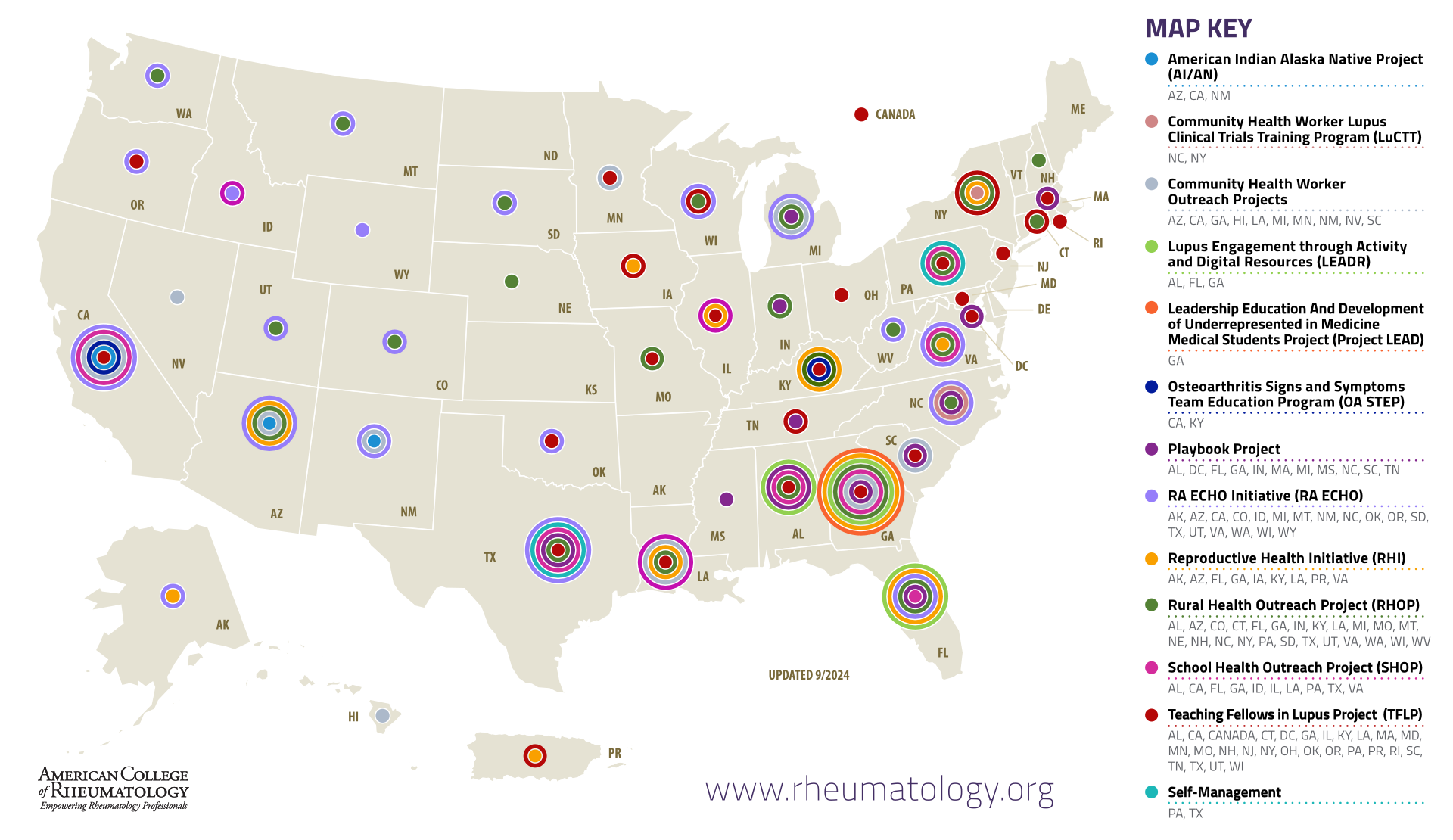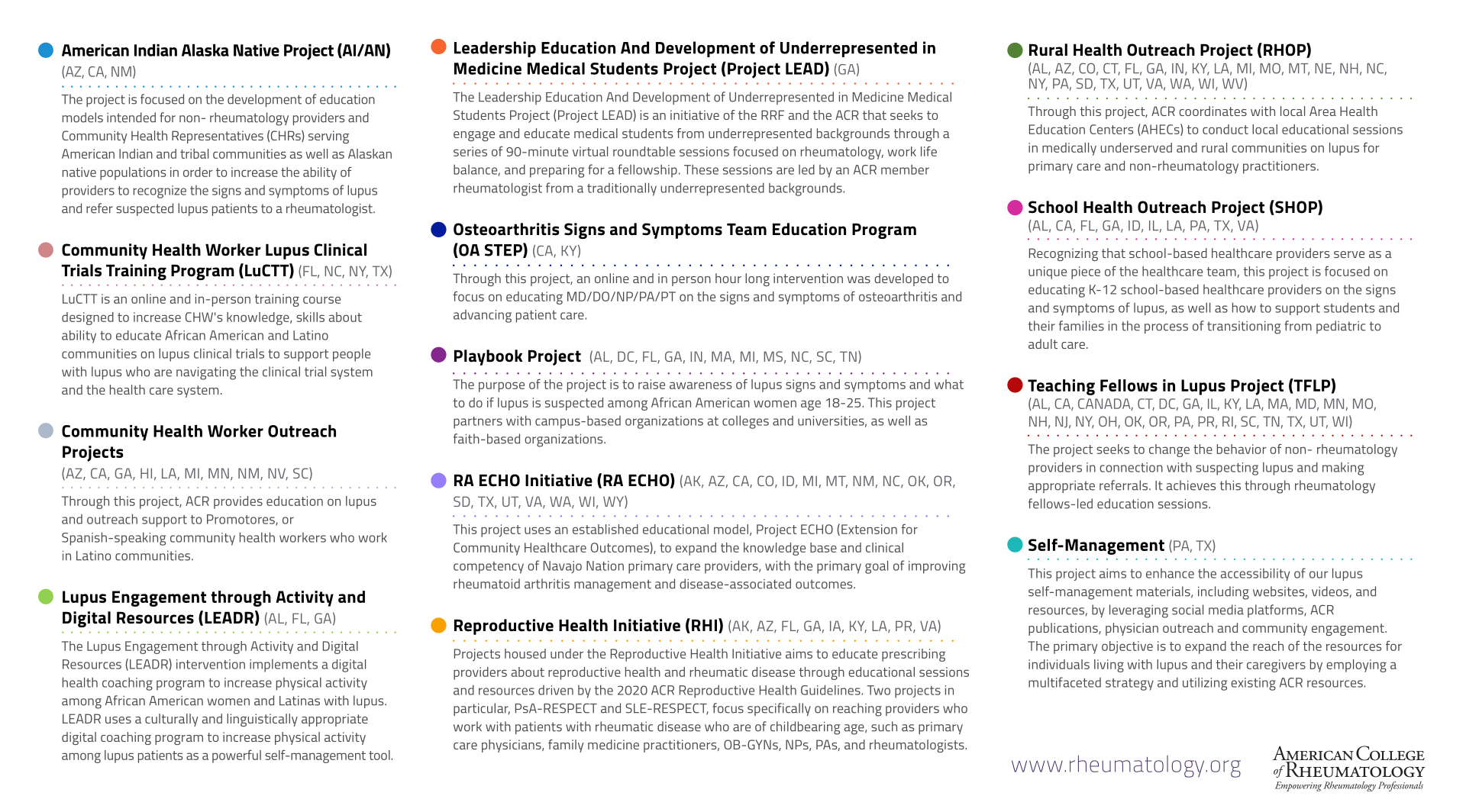Lupus is a complex autoimmune disease that disproportionately affects certain populations, including women, minorities, and those with lower socioeconomic status. Health disparities in lupus care can lead to delayed diagnoses, inadequate treatment, and poorer health outcomes for these groups. The Lupus Initiative has several exciting projects underway to advance the goal of raising lupus awareness and eliminating the associated health disparities.
Projects funded by Centers for Disease Control (CDC):
Projects funded by Office of Minority Health (OMH)
Medical Schools Outreach Project
Through the School Outreach Project, we offer complimentary lupus educational resources to medical and health professional schools in an effort to help increase the number of healthcare providers who are knowledgeable about diagnosing and treating lupus. These resources are also appropriate for teaching more general concepts such as health disparities, management of chronic disease, cultural competence and coordination of care.
If you are an educator at a medical or health profession school who is interested in reviewing our complimentary educational resources and considering them for use in your teachings.
Self-Management Project
We developed an online self-management support tool to provide providers with resources that help people with lupus manage their disease outside of an office visit.
Rural Health Outreach Project
ACR’s Rural Health Outreach Project was developed based on our former Small Groups Projects design model. The project is designed to reduce health disparities and time to lupus diagnosis for impacted populations. We work to achieve this by educating providers and improving referral connections.
ACR’s Rural Health Outreach Project consists of virtual and live educational meetings held at rural Area Health Education Centers (AHECs) between rheumatologists and rural healthcare providers. The rheumatologist delivers a presentation on lupus followed by time for networking and relationship building.
School Healthcare Provider Outreach Project
Recognizing the unique role of school healthcare providers in supporting students, this project connects K-12 school nurses with pediatric rheumatology providers. The rheumatology providers facilitate an educational session on childhood-onset lupus and engage in critical conversations with the nurses and nursing administrators about how they can best support their students and their families if lupus is suspected, and how to support them as they navigate the transition from pediatric to adult care. Resources for school nurses are available to utilize in their work with these students and families.
Teaching Fellows in Lupus Project
Teaching Fellows in Lupus Project
Fellows in rheumatology are enlisted to deliver seminars on the diagnosis and treatment of lupus to non-rheumatology providers. The goal of this project is to change the behavior of non-rheumatology providers in connection with suspecting lupus and making appropriate referrals. It is also an opportunity to increase fellows’ knowledge and positive attitudes, as well as improve patient care and communication between providers. This opportunity is available for both pediatric and adult rheumatology fellowship programs.
Community Health Worker Outreach Project
Community Health Worker Outreach Project
Understanding Lupus is a program for Community Health Workers who work with patients and members of the community. The purpose of this program is to increase CHW’s knowledge about the signs and symptoms of lupus, improve confidence in referring community members to healthcare providers when necessary, and increase knowledge about the importance of minority involvement in clinical trials. Understanding Lupus is facilitated in English, and handouts are available in English, Spanish, Simplified Chinese, Hmong, and Vietnamese.
If your CHW organization or Public Health Institute would like to be considered for our next cohort, please email us for more information.
Community Health Worker Lupus Clinical Trials Training (LuCTT)
In July 2018, ACR received $375,000 in funds from a two-year OMH grant to develop a program related to clinical trials that will focus on minority recruitment. Using a different approach from MIMICT, the Community Health Worker Lupus Clinical Trials Training (LuCTT) program will promote the recruitment and enrollment of minority populations affected by lupus into clinical trials by making use of community health workers (CHWs) as referral sources. The LuCTT program model will include multiple interconnected components that will be used by state, local and community organizations to host regional CHW training summits on lupus clinical trial recruitment support.
The ACR has partnered with Albert Einstein College of Medicine in Bronx, NY, and local CHW networks for the implementation of specific aspects of the LuCTT program. Irene Blanco, MD, Associate Professor of Medicine – Rheumatology and Associate Dean of Diversity Enhancement at Albert Einstein College of Medicine serves as LuCTT project lead, and she will provide the vital support necessary to ensure the cohesiveness in preparation and planning of content development, implementation, evaluation, dissemination and publication.
Materials to Increase Minority Participation in Clinical Trials (MIMICT)
ACR will utilize $500,000 in funding from a two-year OMH grant to develop, evaluate and disseminate modifications of the ACR’s current model for the Materials to Increase Minority Involvement in Clinical Trials (MIMICT) program model developed in 2017 with OMH grant funding to increase minority participation in lupus clinical trials. The initial MIMICT program helped clinical trials sites and providers to work together to deliver accurate, trusted, and understandable information to people with lupus so that they can make informed decisions about participation in clinical trials. Over the next two years, the ACR will expand and modify MIMICT by broadening the pool of providers and patients to which it applies.
The ACR has partnered with two of its member-experts to apply their distinct experiences and resources for the benefit of MIMICT. Dr. Saira Z. Sheikh, MD, Assistant Professor, Rheumatology, Allergy & Immunology, University of North Carolina (UNC) at Chapel Hill and Allen Anandarajah, MD, MS, Associate Professor, Allergy, Immunology and Rheumatology, University of Rochester Medical Center. Dr. Sheikh will harness UNC’s collective expertise in developing clinical trials education programs for minorities to the benefit of MIMICT.
Training to Increase Minority Enrollment in Lupus Clinical Trials with CommunitY Engagement (TIMELY)
Training to Increase Minority Enrollment in Lupus Clinical Trials with CommunitY Engagement (TIMELY) is a two-year, $500,000 grant funded through the U.S. Department of Health and Human Services Office of Minority Health (OMH) that will run through September 2023. The program combines the ACR’s Materials to Increase Minority Involvement in Clinical Trials (MIMICT) model and its Community Health Worker Lupus Clinical Trials Training (LuCTT) model to operate collaboratively with practicing rheumatologists, nephrologists, and dermatologists, and community health workers serving African American and Hispanic patients. The combined intervention will address both provider- and patient-reported barriers to lupus clinical trial participation.
The program will be launched in Raleigh-Durham, NC and Rochester, NY, under the leadership of Dr. Saira Sheikh at the University of North Carolina at Chapel Hill and Dr. Allen Anandarajah at the University of Rochester Medical Center. Dr. Sheikh and Dr. Anandarajah have a track record of success, also leading the ACR’s MIMICT project that was funded by OMH.
For more information about the project access the Materials to Increase Minority Involvement in Clinical Trials (MIMICT) and Community Health Worker Lupus Clinical Trials Training (LuCTT) contact the COIN staff via our contact form.
Collaborative Initiatives (COIN) Projects Map
Explore Our Footprint
This map provides a comprehensive view of our operational footprint in addressing lupus health disparities by conducting lupus skill building and training activities since the beginning of The Lupus Initiative in 2015.


Why Our Locations Matter
To effectively combat disparities in lupus, each location highlighted above represents a place where The Lupus Initiative has hosted or facilitated lupus awareness and skill-building activities. Locations are carefully selected based on their proximity to areas with a shortage of rheumatology providers, the potential for collaboration with local healthcare providers, organizations, and associations, and the prevalence of the disease. This ensures that our activities are bringing rheumatology care to areas of need.
To find out more about how we are addressing rheumatic disease health disparities or to get involved please visit the Collaborative Initiatives Division.

